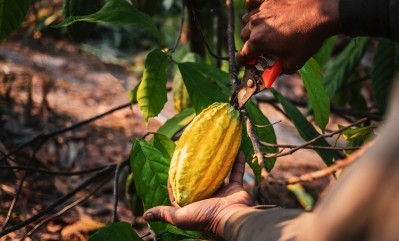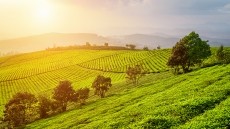‘Buying deforestation-free should not be a choice’: Ferrero ‘well placed’ to comply with EUDR, but sector challenges remain

In preparing for EU Deforestation Regulation (EUDR), it will become apparent that some food and beverage companies are better equipped than others.
Confectionery major Ferrero Group is confident its house is in order, having ‘embedded’ due diligence into its ethos from the beginning, according to Francesco Tramontin, VP, Group Public Policy Center, Ferrero.
But that does not mean potential challenges in adhering to the EUDR do not exist. Associated risks can impact not only the food and beverage industry, but also Member State governments and producing countries, the public policy lead explained.
‘Deforestation-free must not be a consumer choice’
From the end of next year, companies importing soy, coffee, cocoa, palm oil and beef into the EU will be required to submit due diligence reports verifying their products are deforestation-free.
Family-owned Ferrero, which sells its brands (ranging from Nutella to Kinder and Tic Tac) to more than 170 countries globally, already pays close attention to ingredients sourcing. Efforts to date have included streamlining supply chains, working towards 100% traceability, and building ‘long-term relationships’ with its suppliers.
As such, Ferrero supports the EU deforestation legislation, Tramontin told FoodNavigator, at our recent Climate Smart Food digital summit. “It creates a level playing field…It is impactful, it is ambitious, but ultimately it plays into the ‘right way’ of doing things.”
This year, Ferrero achieved more than 96% cocoa traceability to farm gate level and 100% back to origin country, according to its latest Sustainability Report. One-hundred-percent of its palm oil is certified segregated by the Roundtable on Sustainable Palm Oil (RSPO), meaning that it is kept separate from the plantations and farms all the way along the supply chain.
But is important for a company like Ferrero, which aspires to achieve full traceability for high deforestation-risk ingredients palm oil and cocoa, that the legislation does what it intends: stop products causing deforestation from being imported in, sold in, or exported from the EU. “This creates a level playing field…But ultimately, we want this to be impactful across the board,” explained Tramontin.
And here lies a potential challenge. The food sector is highly fragmented, with SMEs making up most food businesses in Europe. Therefore any EU-wide legislation must be able to be implemented by food and beverage majors, as well as smaller operators. “This is the first challenge for everybody: to make sure that [new laws] can be implemented by bigger businesses which have been investing in supplier relationships and [traceability] tools for a long time, but also smaller businesses which have a different type of exposure and a different type of supply chain.”
Failing to encapsulate all businesses into the legislation creates issues on the consumer side as well. The ambition is to make it easy for consumers to choose responsibly sourced food, he stressed. “Deforestation-free should not be a consumer choice. It should be the case across all products, so we need to make sure the whole sector is able to comply.”
Law decided in Brussels, but enforced elsewhere
Another obvious challenge lies in enforcement. The legislation was developed in Brussels, but will be controlled by Member State authorities who are still determining exactly what and how to regulate company supply chains.
The new law applies to diverse raw materials and diverse supply chain dynamics for each raw material, explained the public policy lead. “We are a strong proponent of specific guidelines for each sector, because not all dynamics are the same…It’s about administration, it’s about compliance.”
Although decided in Brussels, the law also must be ‘recognised and agreed’ by Member States.
![2_palm_tree_upclose_fruits[1]](/var/wrbm_gb_food_pharma/storage/images/_aliases/wrbm_large/media/images/2_palm_tree_upclose_fruits-1/16911084-1-eng-GB/2_palm_tree_upclose_fruits-1.jpg)
And engagement is not only required by companies and Member State governments, but by producing countries themselves. The truth is that if these regions do not comply, they will lose access to the European market. “There is a relationship that producing countries need to understand: that this is overall an opportunity to mainstream sustainability,” we were told.
Ferrero has already observed cocoa-producing countries moving in the right direction, but ultimately continues to see ‘a lot of scepticism’ throughout producing countries. This suggests producing countries, and particularly smallholder farmers, require engagement and support to be able to continue to access the European market.
“We care about that as a company and we are growing. So we need wider suppliers and they need to see us as a business opportunity. That’s true for cocoa and that’s true for palm oil, where smallholder farmers are an important part of the value chain.”
And what about hazelnuts?
Not all of Ferrero’s ingredient sourcing will be subject to the new deforestation legislation. Hazelnut for example, a characteristic ingredient in Ferrero brands Nutella, Kinder and Ferrero Rocher, do not present the same deforestation risk as palm oil, cocoa and others.
But similar production dynamics and trends can exist in the hazelnut sector. Hazelnuts are often derived from complex, systemic and deeply ingrained challenges in production countries. Production is also concentrated regions – notably in Turkey.
Ferrero owns its own land and plantations, which means it has already achieved 100% sustainability for those hazelnuts. In FY 2021/22, Ferrero achieved 79% traceability for the hazelnuts it buys.
![1_ALE5145[1]](/var/wrbm_gb_food_pharma/storage/images/_aliases/wrbm_large/media/images/1_ale5145-1/16911102-1-eng-GB/1_ALE5145-1.jpg)
Whether working with palm oil, cocoa or hazelnuts, the confectionery major’s approach is ‘very much the same’, said Tramontin. “It starts with traceability, and it goes into adopting credible standards of production. We are driving standards with partners around what sustainable hazelnut production [means].
“Broadly speaking the approach is the same, the challenges are the same. But the way you go about it is different, because every ingredient comes with its own flavour.”

























